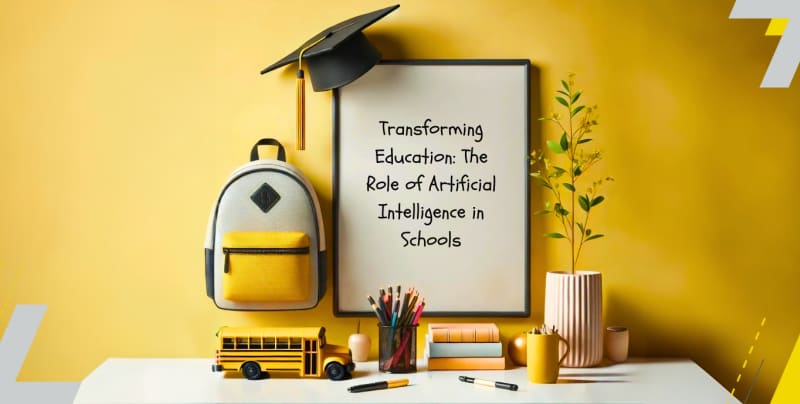Transforming Education: The Role of Artificial Intelligence in Schools
Artificial Intelligence is rapidly becoming an integral part of modern education, offering transformative potential for both teaching and learning. As schools across the UK and beyond increasingly explore the benefits of AI, the implications for students and teachers are profound. This blog post delves into how AI is being implemented in schools, revolutionising the way students learn, how teachers teach, and enhancing security measures particularly in the form of cyber defence.
Innovating Learning and Teaching Through AI
AI’s entry into the classroom marks a significant shift from traditional educational methods. One of the most impactful innovations is the use of AI-powered tools that provide personalised learning experiences. These systems can analyse individual student performance, identifying strengths and areas for improvement. By doing so, AI helps in crafting customised learning plans that cater to each student’s unique needs, ensuring that no one is left behind. For instance, AI-driven platforms can adapt the difficulty of tasks based on real-time analysis of a student’s progress. If a student excels in a particular subject, the AI can introduce more challenging material. Similarly, if a student struggles, the AI can provide additional resources and modify the content to make it more accessible. This level of personalisation, previously impossible with traditional teaching methods, allows for a more inclusive and effective learning environment.
AI is also enhancing the way teachers approach their profession. By automating administrative tasks such as grading and attendance, AI frees up teachers to focus on what they do best: teaching and mentoring students. Teachers can use AI analytics to gain insights, identifying trends and potential issues before they become significant problems. This proactive approach enables educators to intervene early, offering targeted support to students who need it most.
AI supports professional development for teachers. Through AI-powered platforms, teachers can receive personalised training recommendations based on their teaching style, classroom challenges, and career goals. These systems can suggest resources, workshops, and courses that align with the teacher’s needs, fostering continuous growth and improving overall teaching quality.
AI for Enhanced Security and Cyber Defence in Schools
As schools increasingly rely on digital tools, the need for robust security measures has never been more critical. AI systems are playing a crucial role in protecting educational institutions from cyber threats, ensuring a safe environment for both students and staff.
One significant application of AI in school security is its use in monitoring and defending against cyber-attacks. Educational institutions are prime targets for cyber criminals due to the vast amount of sensitive data they hold, including student records, staff information, and financial data. AI can detect and respond to potential threats in real-time, minimising the risk of data breaches. By analysing network traffic patterns, AI systems can identify unusual activities that may indicate a cyber-attack, allowing IT teams to take swift action.
In addition to cyber defence, AI can be used to enhance physical security within schools. For example, AI-powered facial recognition systems can be implemented to monitor access points, ensuring that only authorised personnel enter the premises. These systems can also alert security staff to potential threats, such as unidentified individuals on school grounds. By integrating AI with existing security protocols, schools can create a safer environment for students and staff.
AI-driven predictive analytics can help schools anticipate and prepare for potential security incidents. By analysing data from various sources, including social media, school records, and local crime statistics, AI can identify patterns and trends that may indicate an increased risk of incidents such as bullying, vandalism, or even potential violent threats. This allows school administrators to take preventive measures, ensuring the safety and well-being of the school community.
The Future of AI in Education
As AI technology continues to evolve, its role in education is expected to expand further. In the future, we may see AI taking on more complex tasks, such as facilitating real-time translation for students in multilingual classrooms, offering virtual tutoring sessions, or even providing emotional support through AI-powered counselling services. The possibilities are vast, and the potential benefits are immense.
However, the integration of AI into schools also brings challenges that must be addressed. Issues such as data privacy, ethical considerations, and the need for ongoing training for educators to effectively use AI tools are critical. As we move forward, it will be essential to ensure that AI is implemented thoughtfully and responsibly, maximising its benefits while minimising potential risks.
In conclusion, AI is poised to revolutionise the education system, offering unprecedented opportunities for personalised learning, efficient teaching, and enhanced security. By embracing AI, schools can create a more dynamic, inclusive, and safe environment for students and teacher.




